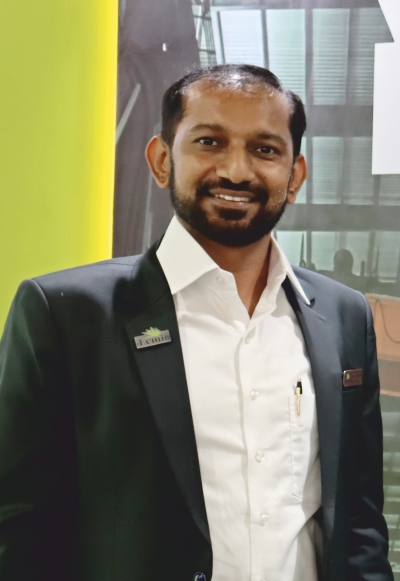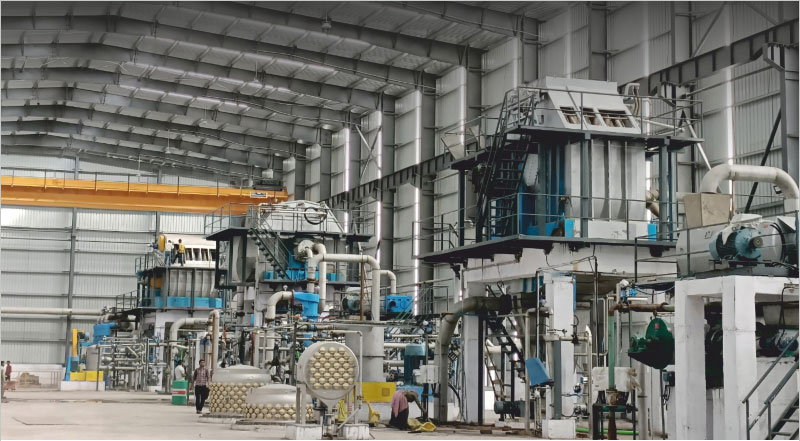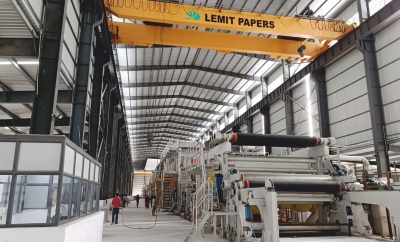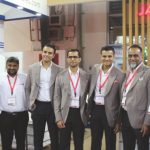
Lemit Papers LLP, a relatively new company to enter the paper sector, has created quite a niche for itself in less than 2 years, by investing in high-end technology and looking for newer markets at the foreign shores. The duplex paperboards produced and distributed under the brand are not only compliant for International standards but also follow a strict code of environmental conservation practices. All of their duplex paperboards and packaging solutions are made out of recycled waste paper pulp yet the quality remains unmatched in the segment. Mr. Narendra Dhoriyani, Director, Lemit Papers, recently shared information about the paper mill’s penchant for quality and technology-driven approach, while having a conversation with Paper Mart during Paperex 2023.
Paper Mart: In less than two years of its inception, Lemit Papers has managed to create quite a niche for itself in the paper market. Tell us more about your journey.
Narendra Dhoriyani: Lemit Papers was established in 2021 as an ambitious project visualized by L-Group of Companies, India’s leading manufacturer and exporter of ceramic tiles. The combined and extensive knowledge of business modules in the ceramic industry made way for this motivated venture in the paper industry. We have a world class facility with the second largest operational duplex board paper mill in Gujarat.
We did not have any previous experience in the paper industry. We did a market survey and found that this industry is all about quality. If your quality is good, then you are good enough to stay. So, we procured the best technology available in the market. We approached experts and vendors. We asked about their machines and technology, how they were different from others. We sought guidance from our General Manager, the production department and related people. We have invested 3 times more in our mill than a regular paper mill, sourcing the best of the best technologies.
PM: How do you think your approach is different from others?
ND: We have invested heavily in our paper mill, three times more than regular paper mills. This is what makes us different from others. Some of the machines have been installed for the first time in India. We are not looking for short-term investment of one or two years, but where we are putting our money right now into, it will remain fruitful for the next 20-30 years. A good machine having the most advanced technology not only produces good quality products, but also leads to better efficiency. If you have a better product, you are ahead of your competitors.
Pricing is a secondary thing, which goes with the market.
Watch: Starkraft to Offer Capacity of 350,000 tons from May 2024
PM: Kindly share some information about the plant, key highlights and technical capabilities.
ND: This is a fully DCS (Distributed Control System)-based automation plant designed by VALMET Technologies. Only eight to ten staff members work in the production department during a shift, which includes both on to the machine and on to the SFT section. We are using the latest software from Valmet, which has been implemented for the first time in India. The machine is well-coordinated with technology. This is the reason why the quality of our product is at par with others.
We have not boarded a deinking plant, but we have put up a three Hot Dispersor system. There are different sets for the top, under top layer and the bottom layer. As we were not satisfied with the quality we were getting, we bought a three-stage Centri Cleaner from Valmet to meet the European and the American market quality expectations.
Normally, the bottom layer is not considered as an important part of cleaning in duplex boards as it is something which goes inside the box and does not need a high-end quality inner side. But this three-stage centric machine thoroughly cleans the bottom layer too. It takes out everything, including all the minor and minute plastic particles, glass particles, metal particles and even dust particles. This is one of the reasons for our superior quality.
The Cellwood Krima Hot Dispersor Machine has been imported from Sweden. We have purchased the Globe rewinder, which is one of the best rewinders available in the market. We also bought six Synchro Fly Paper Sheeter machines. Usually when there is a sheeter machine, there is a chance that dust will come from the sheeter machine too. So, we bought Synchro Fly sheeting technology, which cuts paper in a certain way and cleans out the dust too.
PM: Share some information about the raw material sourcing and pulping setup of Lemit Papers.
ND: The pulping process forms the core or heart of the paper industry. Lemit is the first mill in India to have the full set of pulping system from Kadant Lamort. No other mill in India has this machine. The pulp mill section produces 450 tons per day.
Kadant Fiber Processing-Kadant Inc has some patented technology, which makes their cleaning system way ahead of others. If you see the quality, it’s far better. Our whiteback product is ready to compete with FBB (Folding Box Board). Though it is made from 100 percent recycled products, it is still as good as FBB because of the technology.
We are a recycle-based paper mill. We get waste paper from around the world and there are always chances that waste paper will have impurities, so if we have good technology, a good cleaning system and good machinery in the mill, the pulp will get processed very well. All the minor particles are cleaned up and we get a clean fiber. If the fibers are clean, automatically our paper quality becomes better.
Also Read: Devashray Papers (India) LLP Targeting to Manufacture All Specialty Grades
PM: Please share details about your market footprint.
ND: We started exporting some six months back and are currently exporting to 18 countries. We have footprints in Europe, North America, Africa, Middle East and Asia. All our customers in these countries are satisfied with our products. We are getting regular and repetitive orders from them. We are currently exporting around 20-30 percent of our current production capacity, but in future, we might go up to 50-60 percent of production capacity for export. Out of the remaining 60-70 percent which is not exported, we are selling 25 percent in Gujarat and Maharashtra, around 20 percent in the northern parts of the country, 30-40 percent in South India, and a little less in the Eastern areas of the country. Our market is basically focussed on the western areas.

PM: What is your USP and how is your plant different from others?
ND: In paper machines, we have one of the latest technology bases. Initially, there was one wire technology, then two wires and then three wires. The latest technology available in the paper industry right now across the globe is the four plus one wire machine and we have that. We also have a three-blade coating system. Usually, mills use a bar and blade coating system, but our system has different coating layers. It has a blade-on-blade coating for the top layer and another coating for the bottom layer.
We have not purchased the coating kitchen directly from any vendor, but imported it locally. However, we have done its automation and even in the colour kitchen. Every time we prepare the coating recipes, it automatically saves in a computer. Whenever we have to prepare the recipe, we just click the program and the machine automatically takes all the parts of the chemicals and mixes it. There is no manual involvement at all. Every time, the same quantity of chemicals will be taken and the quality of coating recipes will remain the same.
PM: Tell us more about your product portfolio.
ND: We have two grades of products as of now. We have a coated grey back duplex board and a white back duplex board. In grey back, we have two qualities: lime pack and laser pack. Lime pack is a standard HWC product, which is 16-18 gms of coating and then we have a premium product, which fits into the North American and European markets and has 22-24 gms of coating on the topside. Our products are not only compliant for International standards, but also follow a strict code of environmental conservation practices. All our paperboards are made out of recycled paper pulps, yet the quality remains unmatched in the segment.
PM: Kindly share some information on upcoming products or new launches.
ND: It’s a little hard to say at this point, but product development is on our priority list for sure. We have the required setup to add on a few more products. Not right now, but in the near future, you might see one or two new products coming from Lemit Papers. Our existing machines can do virgin products also. Our machines can manage both virgin pulp and recycle waste paper. Some plans are in the pipeline, but it is too early to say anything.

PM: What are the current trends in the paper industry? Kindly elaborate on the future growth of the industry.
ND: I still feel we are not mature enough to speak about the industry, as we started production only last year. Whatever the experience and I’ve heard from another people, the paper industry is going through a downward trend right now but I want to pass on this message to everyone that whenever there is a fall, there is always a rise. Just keep holding your breath and we will be back again with a good product, a good market and we all will survive together.



